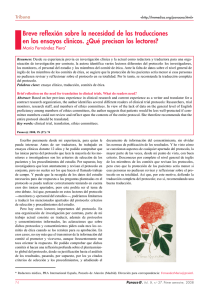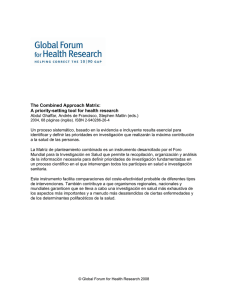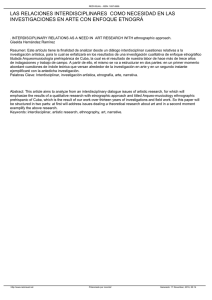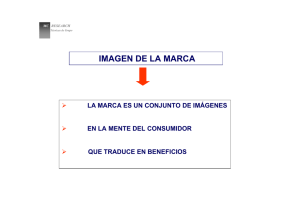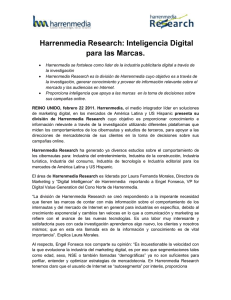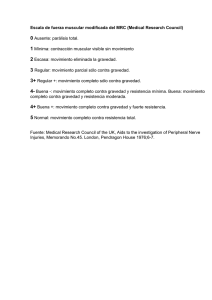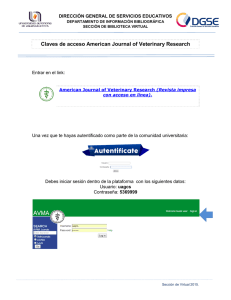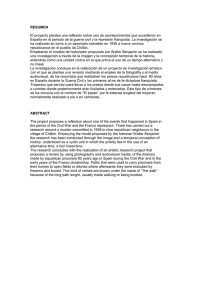Independent Networks Research Ethics Committees
Anuncio
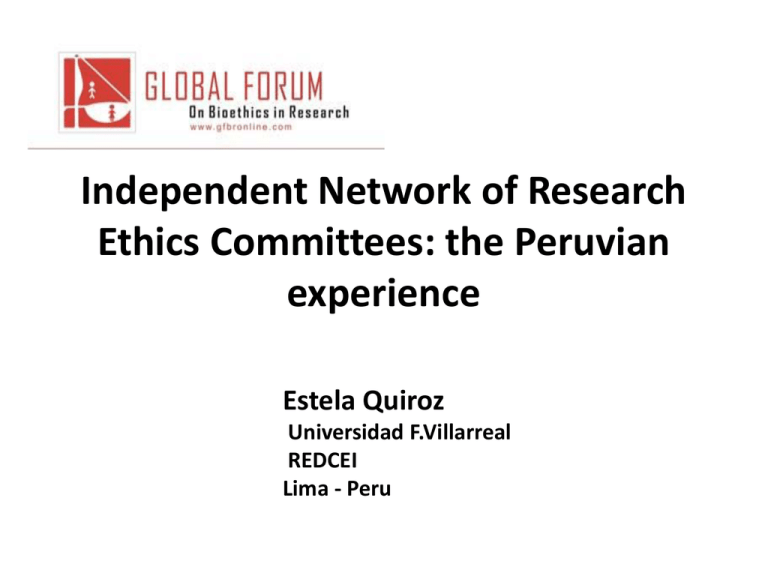
Independent Network of Research Ethics Committees: the Peruvian experience Estela Quiroz Universidad F.Villarreal REDCEI Lima - Peru Contents • Definition and purposes of REDCEI (Independent Network of Research Ethics Committees ) • Training in bioethics research in Peru • Challenges EQM Junio 2014 2 Background • Given the need to communicate between the various committees of research ethics , to avoid IRB shopping, or to share experiences, among other reasons: • 2004: Under the auspices of the Peru INS (National Institute of Health, regulatory authority in Clinical Trials in Peru) and a US NIH Fogarty Grant, the PERUVIAN NETWORK COMMITTEE OF ETHICS OF RESEARCH (REDCEI) was created. EQM Junio 2014 3 Background • 2006: the Regulation on Clinical Trials is promulgated , it includes the registration of the Research Ethics Commitees at the regulatory agency. • REDCEI was called for support. EQM Junio 2014 4 What is REDCEI? • The National Network of Ethics Committees Research (REDCEI) is an independent and autonomous entity that integrates and promotes the development of the Research Ethics Committees at the national level, with full respect for the autonomy of its members. EQM Junio 2014 5 Purpose of REDCEI • The purpose the REDCEI is to link between Ethics Committees Research that conform it, to share knowledge, experiences, information, views and facilities to better fulfill their duties. EQM Junio 2014 6 Main activities a) Disseminate and share information regarding the strict exercise of Ethics in the activities and development of biomedical research. b) To promote communication and exchange of experience between the various RECs nationally. EQM Junio 2014 7 Main activities c) Present and disseminate models of procedures for review, approval and monitoring of research projects. d) Promote continuous training strategies among members of Research Ethics Committees. EQM Junio 2014 8 RESEARCH ETHICS COMMITEES (30) LIMA 1 PIURA • Comité de Ética en Investigación Independiente Piura 1 LA LIBERTAD • Instituto Regional de Oftalmología – Trujillo 27 1 AREQUIPA • Hospital Nacional Carlos Alberto Seguín Escobedo. Red Asistencial Arequipa. EsSalud 1.Hospital Nacional Cayetano Heredia 2.Hospital Nacional Dos de Mayo 3.Hospital Nacional San Bartolome 4.Hospital Nacional Arzobispo Loayza 5.Hospital Nacional María Auxiliadora 6.Centro Médico Naval “CMST” 7.Hospital Nacional Santa Rosa 8.Hospital Nacional Daniel Alcides Carrión 9.Instituto Nacional de Enfermedades Neoplásicas 10.Instituto Nacional de Salud del Niño 11.Instituto de Medicina Tropical Daniel Alcides Carrión UNMSM 12.Instituto Nacional Materno Perinatal 13.Instituto Nacional de Salud 14.Instituto Nacional de Ciencias Neurológicas 15.Instituto Nacional de Oftalmología 16.Instituto Nacional de Salud Mental “Hideyo Nogushi” 17.Hospital Nacional E.Rebagliati M. 18.Hospital Nacional Guillermo Almenara I. – EsSalud 19.Hospital Nacional Alberto Sabogal S.– EsSalud 20.Universidad Peruana Cayetano Heredia 21.Universidad de San Martín de Porres Facultad de Medicina Humana 22.Universidad Nacional Mayor de San Marcos, Facultad de Medicina 23.Asociación Benéfica Prisma 24.Asociación Civil Impacta Salud y Educación 25.Asociación Civil Vía Libre 26.Instituto de Investigación Nutricional 27.NAMRU-6 Components • There are about 30 committees registered with the Peruvian regulatory agency. There are at least 20 others that do not review clinical trials and as such, are not registered. • Most are in the capital of Peru and a few in other cities. • Research is done in other cities and even in Native communities and the Clinical Trials Regulation accepts the approval of research protocols by any Committee registered in the Peruvian regulatory agency EQM Junio 2014 10 Main mission • Since its formation, REDCEI considered one of its main functions the training of its members, through various educational activities promoted by the Network directly or through their participation in events organized by various institutions. EQM Junio 2014 11 Training in research ethics • It started in 2004. • It was a collaborative effort: the state, academia, NGOs, REDCEI. • It represented no expense to the State • Target Audience: Committee Members Researchers Institutional officials • Scientific members • Representative members of the community • Biomedical • Social and behavioral • Public Institutions • Private Institutions Types of training available in Peru 2000 - 2014 • Academic Programs: • Diploma and master, national and international • Internships • Courses, workshops and conference attendance • Virtual Courses EQM Junio 2014 13 TRAINING IN ETHICS RESEARCH, 2000-2012 Institución y lugar Nombre del programa/actividad Financiamiento Características Comentarios Programas Académicos FLACSO Buenos Aires, Argentina Training Program in Research Ethics Centro Internacional Fogarty Universidad de Chile Santiago de Chile, Chile Programa Internacional de Formación en Ética en la Investigación Biomédica y Psicosocial Centro Internacional Fogarty Universidad Nacional Maestría en Mayor de San Marcos Bioética Lima, Perú Organización Panamericana de la Salud (OPS) Programa presencial y virtual, capacita profesionales de la salud y de las ciencias sociales. Directoras Dras. Ruth Macklin y Florencia Luna Curso anual dirigido por el Dr. Fernando Lolas Maestría internacional apoyada por el Centro Regional de Bioética de la OPS. Se ha llevado en dos periodos, 2002-2003 y 2008-2009 Se capacitó a seis profesionales peruanos entre el 2002 y 2010. Ha capacitado a cinco profesionales peruanos entre el 2002 y 2010. Se capacitó entre ambos periodos a 31 profesionales peruanos que culminaron la maestría., la gran mayoría de los cuales no se han titulado. Universidad Antonio Ruiz de Montoya Lima, Perú Diplomado en Autofinanciado Inició en el año Bioética, Salud 2009. y Medioambiente Universidad Nacional Daniel A. Carrión e Instituto Latinoamericano de Ciencia y Desarrollo (ILACID) Lima, Perú Diplomado en Investigación clínica farmacológica, monitoreo y auditoría de ensayos clínicos. Universidad Católica Santo Toribio, Chiclayo Diplomado de Bioética y Jurídica Autofinanciado Inició en el año , auspiciado 2010, 55 de las por Fundación 440 horas para la Ética y académicas del la Calidad de la programa se Investigación dedican a ética en clínica en investigación. Latinoamérica Ha capacitado a 51 profesionales Ha formado 70 investigadores y coordinadores de investigación clínica. (FECICLA) Autofinanciado Inició en el año , auspiciado por el Colegio Médico Ha formado XX investigadores y coordinadores de investigación clínica. Pasantías University of Washington Seattle, USA Uniformed Services University of Health Sciences (USUHS) Bethesda, USA Western Institutional Review Board (WIRB) Washington, USA Foro Perú – Estados Unidos para la Ética y Conducta Responsable en la Investigación Realizada en dos oportunidades durante el 2001, de tres semanas de duración Se capacitó a siete profesionales peruanos. Centro Internacional Fogarty Se inició con un simposio en el 2003 en Lima, luego se capacitó a siete funcionarios públicos de instituciones peruanas por ocho semanas en USUHS Al regreso hicieron réplicas a través de cursos realizados en Cusco, Lima y Trujillo donde participaron más de 500 profesionales en el 2004. Fundación Middleton Programa de seis meses a dedicación exclusiva, durante los cuales el pasante profundiza la discusión de aspectos claves de ética en la investigación y participa en la revisión y discusión de ensayos clínicos, como miembros invitados del WIRB. Se capacitó a tres profesionales peruanos. Classroom training • 2001: 1st Hospital Dos de Mayo with support UPCH, WU and OHRP • 2005: International Conference in Lima and Iquitos. NIH, WU, UPCH and NAMRU-6 • 2007: International Conference in Lima and Arequipa. NIH, OHRP and OPS. • 2007-2010: FLACEIS 6 Training Courses • 2001 -2008: Impact (NGO s) Courses GCP Short on site courses • 2005 onwards: approx. 15 training courses that include international conferences with the participation of UNESCO, NIH, Miami University, Washington University , FLACEIS, among others. • 2005-2012: Workshops REDCEI 8 courses in Lima, Iquitos 3, 2 in Arequipa, 1 in Cusco, and 1 in Trujillo, to ERC members and researchers. • For new members of ERC. • Two workshops for community members. On line courses • 2004 al 2011 US NIH Video conference "Ethical and Regulatory Aspects of Clinical Research", • 7 days per week, 4 hours each session, from September to November each year, • Free of charge, by the Department of Bioethics at the NIH in the USA. • It has certified more than 400 professionals in Peru through 9 hubs in Peru: INS, San Marcos University, Cayetano University, Hospital Ciencias Neurologicas, Impacta, NAMRU, and 3 sites in provinces. On line courses • FLACSO Argentina and the UNESCO Bioethics Network offer on line courses in research ethics that are held every year, we do not get data on the number of trainees. • Webminar, much like the video conference, with the difference that in the webminar can not ask questions in real time. • Between 2005 and 2010, the REDCEI has co-organized with OPS and Red Cochrane, a total of five webminars. On line courses • CITI (Collaborative Institutional Training Initiative) Program and the University of Miami in Florida, USA, has benefited more than 1,000 people, researchers and members of CEI Peruvians, certifying the virtual training. • Peruvian Medical Association (Colegio Medico del Peru): Virtual Diploma in Clinical Bioethics and Bioethics in Research, in 2012 and 2013, with over 350 students trained in Peru. Some conclusiones • Ongoing training is very important for the RECs to meet their primary function: to protect research participants. • The establishment of a Local Regulatory Framework for Clinical Trials allowed the committees to have the legal basis to function properly. • To date we have a critical mass of people trained (“not formal"?) In research ethics, and “informal“ education. A In spite of all the efforts, .. • Many universities do not have ethics committees (4 out of 28 medical schools in Peru have RECs) for review of their own academic research. • Many researchers continue to receive very little to no training in research ethics. In spite of all the efforts, .. • Diplomas or Masters in Bioethics by universities have reduced the gap of REC members formally trained, an essential need to Peru and a regulatory requirement by the Peruvian Regulation for Clinical Trials (“at least one member trained in Bioethics”) Communication between members It is continuous through email. Essentially of two types: 1. Questions: Any problem or circumstance in relation to research protocols or other The case is anonymized and is broadcast to the network. Sometimes we consult colleagues in Latin America who always provide good suggestions. A consolidated response is sent with the necessary suggestions. EQM Junio 2014 25 Communication betwen members 2. Alerts: When a ERC disapproved a protocol and there is a chance of “IRB shopping”. Information is provided just to all the chairmen of the committees that make up the REDCEI, stating the reasons why the protocol is sent to be not surprised. EQM Junio 2014 26 • To date we have met the objectives of the REDCEI especially in communication between members and training. Challenges • Expand training in research ethics at the levels of undergraduate and graduate • Not only in medical schools but in all areas investigated in humans • Raising standards for ethical review of research studies: • Having resources and personnel • Establish criteria for approval • Perform quality control post-approval Contact to: Estela Quiroz bioetica09@ yahoo.com EQM Junio 2014 29
